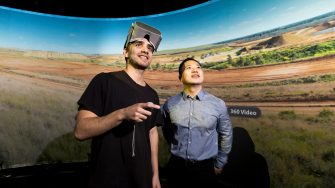
The various combined degrees between Engineering and Science, and their formal rules, are:
- Engineering (Hons)/Science - Program 3767
- Advanced Maths (Hons)/Engineering (Hons) - Program 3761
- Advanced Science (Hons)/Engineering (Hons) - Program 3762
-
- Aerospace Engineering
- Bioinformatics Engineering
- Chemical Engineering
- Civil Engineering
- Computer Engineering
- Electrical Engineering
- Environmental Engineering
- Geospatial Engineering
- Industrial Chemistry
- Mechanical and Manufacturing Engineering
- Mechanical Engineering
- Mechatronic Engineering
- Mining Engineering
- Naval Architecture
- Petroleum Engineering
- Photovoltaics and Solar Energy
- Renewable Energy Engineering
- Software Engineering
- Surveying
- Telecommunications
- Flexible (for students who have not yet decided which discipline of Engineering they wish to pursue)
- Aerospace Engineering
The bottom line for a Mathematics or Statistics major within the Science component in each of these degrees is roughly the following:
- In ADDITION to the Science courses taken in the Engineering component, additional units of credit of Science courses must be taken up to 96uoc, 12 of these as a replacement for General Education, the others as an extra year.
- Include a major in Mathematics or Statistics.
- Include at least 24 units of credit of First Year Science.
- NOTE that COMP courses do not count as Science courses.
- NOTE that in all of these degrees, some of the Mathematics and Statistics courses normally taken within the Engineering component must be REPLACED by courses from the Mathematics and Statistics major - see the information below or get advice from the School of Mathematics and Statistics on this by emailing ug.MathsStats@unsw.edu.au
- Conversely, for students in Adv Maths/Eng (programs 3761) or Adv Sci/Eng (programs 3762), the compulsory SCIF course can be replaced by ENGG1000.
- NOTE that in some combined degrees, where not many units of credit are taken from Science within the ordinary Engineering degree, then extra Science units may be necessary in place of some Engineering electives - check with the The Hub for details.
- IN ALL CASES you should check with the The Hub that what you plan meets the rules for the Science component of the Combined degree. The School of Mathematics and Statistics cannot make this decision.
-
If you are already taking an engineering degree, or a dual degree but not originally intending to take one of our majors, decide to take one of our majors, and have taken some or all of the engineering service MATH courses already, you will still need to complete the MATH courses of the new major. By an agreement between the Faculties of Science and Engineering, the service MATH courses can be counted as Science electives in the dual degree. This "one-way exclusion" only applies to students who have done the service courses first.
Note that:
- The service MATH courses are excluded against the standard MATH courses, so you will need to contact the School of Mathematics and Statistics or The Hub to arrange your enrolment -- the University's system will block you.
- You may end up taking more than the minimum number of courses for your degree, depending on how late you leave the addition.
- If you drop the maths, oceanography or stats major, this concession may not apply.
- The service MATH courses are excluded against the standard MATH courses, so you will need to contact the School of Mathematics and Statistics or The Hub to arrange your enrolment -- the University's system will block you.
